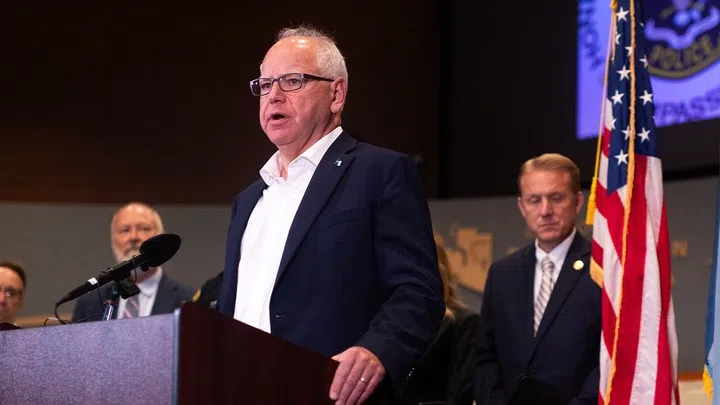After weeks of anticipation, Democratic Presidential Nominee Kamala Harris has chosen Minnesota Governor Tim Walz as her vice-presidential running mate in her bid for the white house.
This decision left Willa Cather Professor of Political Science at the University of Nebraska–Lincoln Elizabeth Theiss-Morse “a little surprised.”
Turns out, Walz hails from the cornhusker state. He was born in the city of West Point in 1964, grew up 4-hours away in the city of Valentine, and earned his bachelor’s degree at Chadron State College. Later, Walz moved to Minnesota and was elected to the U.S. House of Representatives from Minnesota’s 1st congressional district in 2006. He stayed in congress until 2019, after which he was elected (and reelected) as Governor of the state.
Inversely, Prof. Theiss-Morse grew up in the small Minnesota town of Alexandria, and moved to Lincoln after graduating from the University of Minnesota in 1988. In her political science expertise, she thought Harris’ VP pick would hinge more on cold realpolitik strategy.
“I thought that Harris would probably pick Josh Shapiro, maybe because of the need for the Democrats to win Pennsylvania. Or for Arizona, it could have been Mark Kelly… Minnesota has voted democratic for many, many, many years. So I was a little surprised that Harris didn’t go with one of the other people who are in a swing state,” she said.
When asked to analyze the weight of this decision from the Harris campaign, Theiss-Morse said — among political scientists — “Vice Presidential picks make no difference whatsoever. When people calculate for whom to vote for, they rarely weigh heavily who the VP candidate happens to be.”
But political sciences aside, the Theiss-Morse believes Harris wanted her VP pick to have more “mass appeal” than “swing state appeal.”
“The thing that stands out about Walz is that he has been very successful politically,” she continued. “When he was in Congress, he was very successful in a district that’s a very republican district in Minnesota. He was able to cross that boundary. At one point when he was Governor, he had a divided legislature, but was very willing to work with Republicans in the state and come up with compromised solutions. When the House and the Senate in Minnesota went to the Democrats, he worked with the Democrats and got a lot done.”
Another benefit Theiss-Morse thinks Walz will bring to the Harris ticket is his every-man humble appeal.
“He’s considered a nice, folksy guy. He was born and raised in Nebraska, so he’s got to be nice because Nebraskans are tremendously nice. He’s a rural person, a rural midwesterner, and there’s a certain appeal to that, especially offsetting Harris’ California roots,” said Theiss-Morse.
However, Walz may bring certain hurdles to the race.
“Because of his policy decisions as Governor when both of the houses of the state legislature were in democratic hands, it makes him look more progressive than I actually think he is. He’ll likely be tagged as a far left progressive liberal, just off the scales. But I don’t think that’s true. He does support things like women’s right to choose, and he was very active on trying to get free lunches for kids in school,” Theiss-Morse said. “But at the same time, nobody outside of Minnesota knows him. He’s a bit of a blank slate.”
“I think he can be hit pretty hard on the George Floyd protests that came up in 2020,” she added. “As the Minnesota governor, when those protests occurred, he was slow to bring in a sufficient amount of force to try to take care of the major problems that were happening in the city at that time.”
Harris’ republican opponent, Former President Donald Trump, selected Ohio Senator J.D. Vance as his running mate. Theiss-Morse said the Walz pick will balance out the midwestern ticket appeal.
As a kind of ‘first offering’ to the Harris campaign, Walz sent waves through national political discourse by saying of the former president and his running mate, “These guys are just weird.”
“Republicans have been much more successful in communicating ideas in a quick, impactful way than the Democrats have been. I think Democrats communication has been really horrific. What the Democrats have lacked is somebody who can just summarize in a word or two an idea in a way that the Republicans have been so successful at doing. I’m not convinced that Walz is the person who can do that, but I do think that it is something that the Democrats need to work on,” Theiss-Morse said.
A native Nebraskan on the ticket may be the state’s wildest dream. However, Nebraska has been a political stronghold for Republicans for many decades. Due to the state’s approach to electoral college vote allocation (district-by-district as opposed to winner-take-all), the congressional district encapsulating the city of Omaha (NE-02) stands out as a unique district which notoriously went to Democrats in 2020 — dubbed the “blue dot.”
Could Walz on the ticket lock down NE-02 for the Harris-Walz ticket? Or even make for a close race in NE-01 and NE-03?
“I wouldn’t go that far,” Theiss-Morse laughed. “As I said, the vice presidential candidate just doesn’t matter that much. Nebraskans like their people. So I think Nebraskans will like the idea of having a Nebraskan on the ticket. It could make a difference in the Omaha area. But I would guess what’s going to drive that is more Harris on the ticket and Tony Vargas — more the local politics and then who is the head of the ticket.”
If Harris was one of Theiss-Morse’s students, perhaps enrolled in a hypothetical call “Run For President 101,” she said she would give Harris a solid “B” so far.
“I thought her 2020 campaign was just horrific. When people were talking about Joe Biden potentially stepping down, I was one who said, ‘Yeah, but then who’s gonna come forward? Who do the democrats have?’ So I have been surprised that she has come out as strong as she has,” the professor concluded.
The answers to these questions will be given on the campaign trail in the coming weeks, and finally, on the November 5th general election ballot in less than three months.


